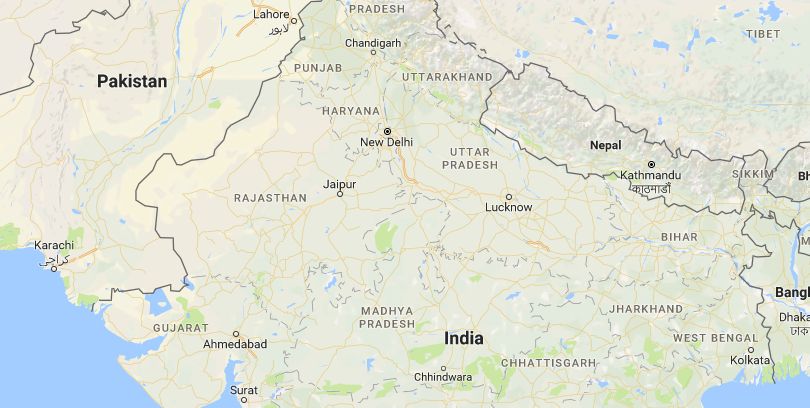The War On Water
India attempts to break international law and put millions of lives in danger
December 7, 2016
Water. One of the essential things any living creature needs in order to survive. Without proper hydration, any living creature will die in one of the most painful ways possible. While we sit here in the Chicagoland area comforted by Lake Michigan, thousands of miles away, across the sea, there are people convulsing upon the dirt below themselves due to a lack of clean water. Experts for many years have been sending warnings that as the population increases, the war over water will become more and more relevant. However, now it seems that that war has just begun.
Pakistan was described as one of the world’s most “water-stressed” countries in a 2013 – 2014 Asian Development Bank report. So when the Indus Water Treaty, one of the most crucial water distribution treaties, begins to fall through, all of Pakistan became inflamed with an incredible pressure. With Pakistan already having difficulties controlling the pollution in the river, this extra weight on their shoulders furthers the tension.
The Indus River Treaty originated in 1947 by The World Bank giving Pakistan control over the three western rivers (the Indus, the Chenab, and the Jhelum) and India control over the three eastern rivers (the Beas, the Ravi, and the Sutlej). The Indus Waters Treaty arose due to the fact that Pakistan’s rivers flow through India first, which made them fear that this could create droughts and famines could result from in the event of a conflict between the two. Because the western rivers first flow through India, the Treaty dictates that India gets 20 percent of the rivers while Pakistan gets the other 80 percent.
Now let’s take a step back. Why was this treaty drawn up in the first place? It was brought up because of an ideologically divided area between India and Pakistan known as Kashmir. The people of Kashmir are a majority of Muslims, however, many in Kashmir have no love for Muslim-dominated Pakistan, but they also oppose the idea of being Indians. However, Kashmir holds several incredibly rare natural resources, one of which is Kashmir wool and the second of which is Kashmir Saffron. Both of these things are specific and special to Kashmir due to the composition of the land.
This territory has been in dispute since the 1960s. After the war between Pakistan and India ended in 1972, Prime Minister Indira Gandhi of India and President Zulfikar Ali Bhutto of Pakistan signed the Simla treaty, which presided over Pakistan’s land of Kashmir. This treaty reversed the consequences of the war. They reopened their borders to trade and economic benefits and agreed any dispute should be handled peacefully from that point forward.
However, despite this treaty, the disputes of Kashmir continue to this day. In response to the recent skirmishes that occurred, Indian Prime Minister Narendra Modi chooses to use water as its weapon of payback for recent cross-border violence. “Blood and water can’t flow together,” Modi said and henceforth shut down any meetings to discuss the treaty.
Now with the uproar in India over the clashes in Kashmir, the government may declare the war for water official, costing a great many lives. India has said it is looking at maximizing its water usage by accelerating the construction of hydropower plants along the western rivers that Pakistan relies on. It has also hinted at reviving the Tulbul project, a dam that has been a source of dispute between the two countries since 1987. Pakistan declared that it is a violation of the treaty because the dam will control the flow of the river. However, India believes that the dam will allow for better access to navigation. The project is currently shut down due to the dispute, however, may be revived in the future.
The main problem is that the Indus River supports nearly three-quarters of Pakistan’s total irrigation of agricultural land. Factors such as pollution and an expanding population are already weighing on water availability per capita, even as demand is forecast to rise in the future. However, according to an interview with Rebecca Keller on CNBC, an analyst at geopolitical intelligence firm Stratfor, India may have some leeway.
Keller has stated that: “Under the treaty itself, India is allowed the use of 20 percent of the western rivers, the Indus, Chenab and the Jhelum, and it currently does not take full advantage of this allotment [so] India has room to use water as a rhetorical tool while still staying within the parameters of the agreement.”. However, Pakistan’s economy and agriculture have such a heavy reliance on the water itself, that even a small volume of water could prove to be incredibly disastrous.
In response to India’s harsh tone for the Indus River Treaty, Muhammad Mohsin Khan Leghari, a member of the Pakistan Senate, according to CNBC, said: “The Indus Water Treaty has survived hostilities and even wars over the five decades since it was inked. Breaking an international treaty would be a dangerous precedent for a country aspiring to be a major global economic power.
However, India is currently also going through a political stride and it could be that this was said as a form to try to get the people’s support. “I take Modi’s threats as rhetoric to drum up support for his party in the forthcoming state elections, as Pakistan bashing goes well with the Indian voters,” Leghari said.
Despite this, bringing up water as a form of weaponry is a serious violation of any form of basic human rights, morals, and etiquettes. Pakistan has clearly stated that revoking the treaty can be seen as “an act of war”. Sartaj Aziz, the adviser to Pakistani Prime Minister Nawaz Sharif, has said that they would approach the United Nations and the International Court of Justice if India unilaterally suspended the treaty. Aziz has also stated, according to International Business Times, “Pakistan will not accept Indian aggression in any form, and any Indian step for disrupting water flow as [an] upper riparian state will pertain to considerable risk of war and hostilities,”.
With both countries carrying nuclear arms, an all out war would be incredibly disastrous. Although Pakistan has a strong army, it is nowhere near as powerful as India’s army. Their only option would be to go nuclear and even that would be like slicing their own throat. The damage that the loss of water will do to the citizens will prove to be more disastrous than any war ever. As the heat across the land rises, death by dehydration will be excruciating as its citizens will be trembling in the dust like fishes out of the water. The body count will be merciless, so if India has the morality of any decent human being, perhaps they will think twice before creating a war over water.





















Dr.H.Mohan • Dec 7, 2016 at 10:09 am
Speak about Terrorism , Drug War, Fake Currency being pumped into India etc; to have a completeness in your agrument and thesis.